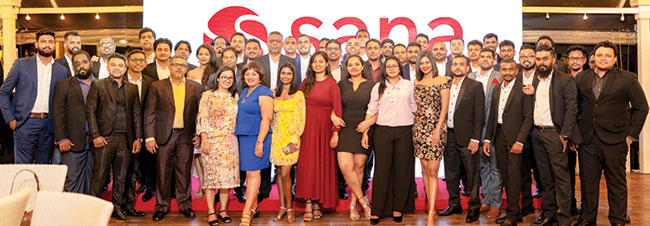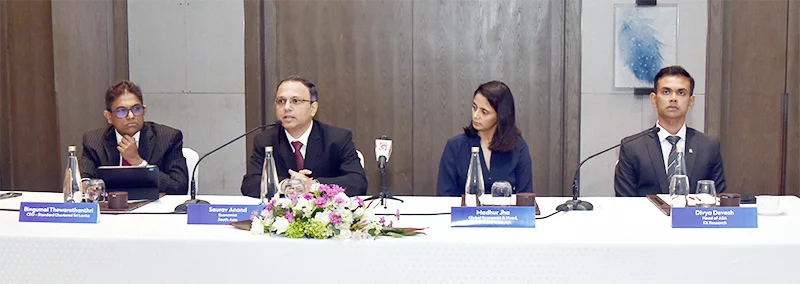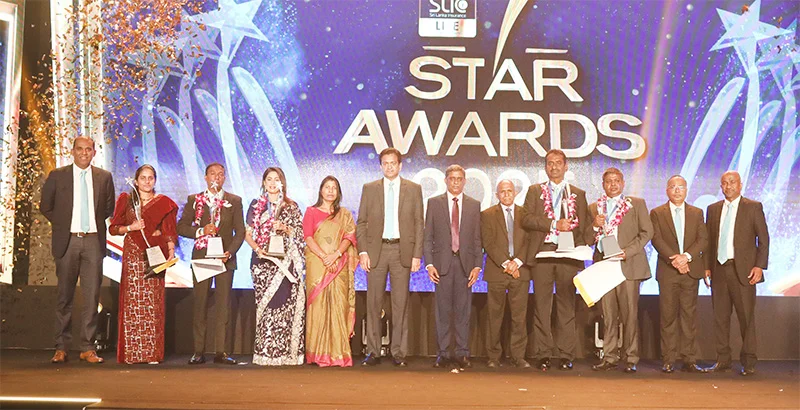Business
ISM APAC announces strategic alignment with Sana Commerce

Leading e-commerce solutions provider, ISM APAC announced its unification and transition with Sana Commerce Global, a leading Netherlands-based e-commerce company, as Sana Commerce Sri Lanka.
This move comes after concluding seven successive years in the industry independently, primarily serving the Asia Pacific region and being one of the main development centers for its headquarters.
With over 180 employees, this number is only growing stronger as this transition can now allow it to expand its scope to cover a range of development services to a much wider audience. This also indicates that every individual will now be able to get a global exposure, not limiting just to the Sri Lankan context, and have a rich, diverse, and holistic experience including a multitude of knowledge, learning and training initiatives at Sana Commerce.
Sana Commerce is an e-commerce platform designed to help manufacturers, distributors and wholesalers to connect, manage and succeed in creating long-lasting relationships with customers who place their utmost trust in them. It focuses on improving the relationship cycle rather than mere transactions. Some of the recent recognitions Sana Commerce received include being named as a Strong Performer by Forrester, Winner of Best E-shop at the E-Commerce Germany Awards 2021, and Leader Mid-Market from G2.
‘‘Our development center based in Sri Lanka consist of a talented pool of professionals who has been instrumental in our success and innovation, taking a lead on numerous projects and never falling short of exceeding our expectations. With this alignment, we will only continue to grow in leaps and bounds,’’ said Michiel Schipperus, CEO & Managing Partner at Sana Commerce.
Sana Commerce Sri Lanka was ranked among the Best Workplaces in Sri Lanka for 2021, 2020, and 2017, and Best Small and Medium IT/ITes Workplaces in Sri Lanka last year by Great Place to Work Sri Lanka. The company’s culture is built on encouraging individual growth through active dialogue, creativity and knowledge-sharing initiatives both internally and externally including guest lectures at universities and sponsoring various hackathons particularly She Coderess, a Sri Lankans only all-female hackathon.
“We also started out as one of the main development centres for Sana Commerce, but with this transition, we can now reach all corners of the world, covering development, providing solutions and much more,” said Priyantha Bethmage, Managing Director at Sana Commerce Sri Lanka.
The company also strives to empower and help various communities through well-defined outreach projects spearheaded by its CSR Committee. Its ‘Sipsatharata Arunallak’ – ‘Helping hands for Education’ continues to play a pivotal role in helping underprivileged children gain access to quality education, one of its philanthropic goals.
With its new face, Sana Commerce Sri Lanka will open the doors to have a much more holistic and expansive international experience for the employees who were working in a bubble of the Sri Lankan context.
Business
Renowned Indian economist questions why Sri Lanka’s early social gains haven’t fueled lasting growth

Celebrated Indian economist Dr. Arvind Subramanian urged Sri Lanka to look beyond its current economic stabilisation, warning that the nation’s early human capital gains have historically lagged to translate into long-term, resilient growth.
Delivering a thought-provoking lecture at the Central Bank of Sri Lanka last week, the former Chief Economic Advisor to the Government of India placed human capital at the centre of Sri Lanka’s economic performance and what he described as puzzles – for which he knew no answers.
While acknowledging talks of regained stability and a growth shift here in Sri Lanka, Dr. Subramanian cautioned strongly against complacency. “Do not take stability for granted,” he emphasised, noting that macroeconomic stability has been very elusive in Sri Lanka’s past and that the recent crisis severely eroded living standards for ordinary citizens.
Quoting Austrian economist Joseph Schumpeter, he remarked: “The spirit of the people, its cultural level, its social structure… everything is written in fiscal history.” A country’s tax and expenditure patterns, he stressed, reveal deep truths about its societal and economic priorities.
Drawing a sharp contrast with India, he observed that while Sri Lanka achieved impressive early advances in health and education through deliberate state policy, India’s human capital improvements came largely after economic growth.
“In India, significant improvements in human capital indicators came after and because of economic growth. It happened despite society and despite the state, largely due to economic growth. Then growth boosted state resources for education and prompted families to invest in education spurring the rise of private institutions,” he explained.
“In contrast, Sri Lanka’s human capital space was characterised by early state-led achievements in health and education, preceding significant economic growth – a path that has not yielded the expected growth dividend,” he pointed out.
His analysis showed that Sri Lanka had a pressing intellectual and policy challenge:
In essence, it asked, why has Sri Lanka’s historical investments in people not driven more robust and sustained economic progress? And what must change in the country’s fiscal and economic strategy to turn its human potential into a true engine of secure and shared prosperity?
The lecture served as both a warning against complacency and an invitation to re-examine the fragile links between fiscal policy, human capital, and long-term economic destiny. For a nation on a fragile path to recovery, what he meant was: “Lasting stability must be built on tangible gains from its people’s capabilities.”
Despite Sri Lanka’s justifiable pride in its skilled workforce and social achievements, Dr. Subramanian’s insights revealed a different reality – one that calls for reflection and renewed strategy from the country’s policymakers.
However, a notable gap in the analysis was the absence of a contrast regarding Sri Lanka’s social fabric. While Dr. Subramanian powerfully quoted Schumpeter – that a nation’s spirit and social structure are written in its fiscal history, – he did not apply this lens to compare the cultural values and social structures of Sri Lanka and India, factors that may be critical to understanding the very paradox he outlined.
By Sanath Nanayakkare
Business
Standard Chartered: Sri Lanka’s 2026 economy bolstered by political stability

As Sri Lanka moves further away from its economic crisis, bolstered by an expected period of sustained political stability, the economic conditions are shifting from recovery to long-term stability, experts said at the Global Research Briefing hosted by Standard Chartered Bank in Colombo.
Calling a discussion with the financial press on 20th January, they outlined an outlook for Sri Lanka in 2026 that balances optimism with a necessary cautious view of the challenges ahead.
A primary point of discussion was the stance of the Central Bank of Sri Lanka (CBSL). Analysts believe the CBSL will maintain a cautious outlook throughout 2026. This vigilance is largely driven by sustained private-sector credit growth, which is currently trending above 20%. While such growth often signals a reviving economy, it carries the risk of an adverse impact on external-sector stability. Specifically, a surge in credit could fuel a spike in consumption imports, potentially straining the country’s hard-earned reserves.
The researchers’ report highlights that Sri Lanka’s 2026 outlook is significantly bolstered by political stability and policy continuity. Following the 2024 parliamentary elections, where the president’s party secured a more than two-thirds majority, the legislative path for continued reforms appears clear. Although provincial elections are anticipated in the first half of 2026, researchers suggest these are unlikely to derail the current policy trajectory, providing a predictable environment for both domestic and foreign investors.
In the foreign exchange markets, a gradual depreciation of the Sri Lankan Rupee (LKR) against the US Dollar (USD) is expected as the year progresses. Standard Chartered has maintained its USD-LKR forecasts at 309 for mid-2026, reaching 315 by the end of the year.
This shift is closely linked to the narrowing of the current account (C/A) surplus. While the C/A is expected to remain in positive territory, it is projected to narrow to approximately 1% of GDP in 2026, down from an estimated 1.8% in 2025. This narrowing is a byproduct of a strong growth recovery which naturally drives up demand for both consumption and investment-related imports. However, this pressure will be partially mitigated by a decline in car imports, they believe.
They further note that:
Despite the narrowing surplus, two critical pillars of the Sri Lankan economy – tourism and remittances – remain robust. Tourism is forecasted to grow by 5-10% in 2026, continuing its role as a vital supporter of the current account. Similarly, worker remittances are expected to stay strong, even as growth rates moderate from the high 20% levels seen in 2025.
In summary, the consensus from the briefing was clear: ‘Stay the course on reforms because that’s the essential ‘brick by brick’ strategy required to ensure the sustainability of Sri Lanka’s economic future.
By Sanath Nanayakkare
Business
SLIC Life recognises its top sales personnel

Sri Lanka Insurance Life celebrated its top sales performers at the Star Awards 2025 gala held at Cinnamon Life, Colombo. Under the theme “Rise of the Legends,” the event honored over 300 high achievers for their exceptional 2024 performance.
The awards recognized excellence across categories, including top Insurance Advisors, Branch Managers, and Bancassurance professionals. Key winners included All Island Best Regional Manager P. Sathiyan and All Island Best Advisor K.G.A.S.L. Weerasinghe.
Chairman Nusith Kumaratunga, CEO Nalin Subasinghe, and the corporate management joined over 350 attendees to celebrate the achievers. The evening reinforced the company’s culture of excellence as it strives to be the nation’s leading life insurer.
-

 Business21 hours ago
Business21 hours agoComBank, UnionPay launch SplendorPlus Card for travelers to China
-

 Business2 days ago
Business2 days agoComBank advances ForwardTogether agenda with event on sustainable business transformation
-

 Opinion7 days ago
Opinion7 days agoAmerican rulers’ hatred for Venezuela and its leaders
-

 Opinion5 days ago
Opinion5 days agoRemembering Cedric, who helped neutralise LTTE terrorism
-

 Business5 days ago
Business5 days agoCORALL Conservation Trust Fund – a historic first for SL
-

 Opinion4 days ago
Opinion4 days agoA puppet show?
-

 Opinion2 days ago
Opinion2 days agoConference “Microfinance and Credit Regulatory Authority Bill: Neither Here, Nor There”
-

 Opinion7 days ago
Opinion7 days agoHistory of St. Sebastian’s National Shrine Kandana













